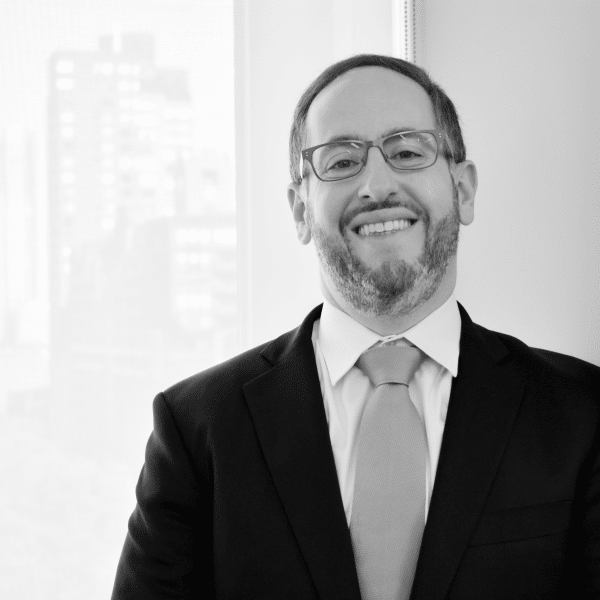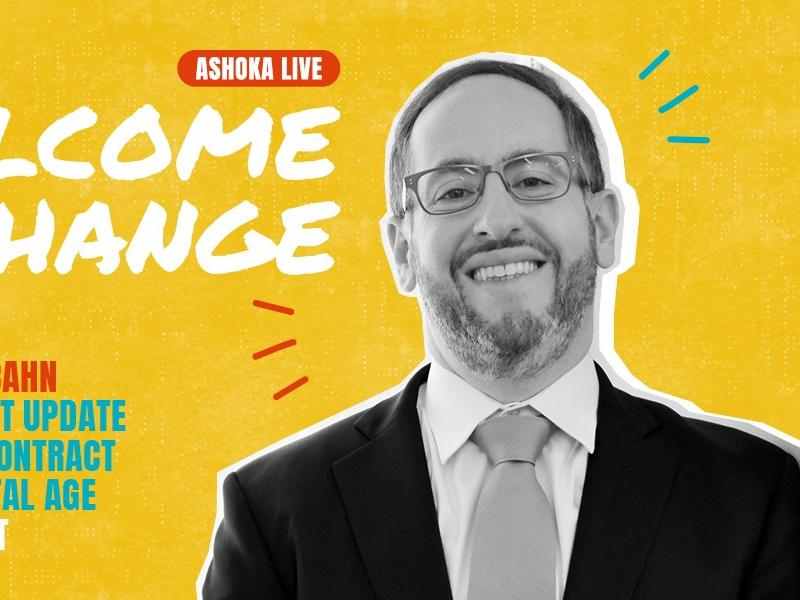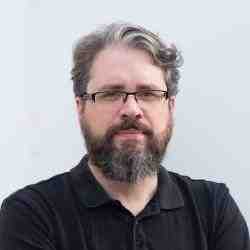Introduction
Albert Cahn is the Founder of Surveillance Technology Oversight Project, or S.T.OP., a community-led response to the new wave of tech-enabled surveillance that is being deployed against marginalized communities in New York and beyond. S.T.O.P is building better oversight of rights-infringing technologies via litigation, legislation, and community education and mobilization.
The New Idea
Albert Cahn is building a community-led response to the new wave of tech-enabled surveillance that is being deployed against marginalized communities in New York and beyond.
Albert and his organization, Surveillance Technology Oversight Project or S.T.O.P., are building a state-level digital rights movement in New York to build better oversight of rights-infringing technologies via litigation, legislation, and community education and mobilization. Through his work in New York, Albert has launched a successful anti-surveillance model and infrastructure that is being replicated in states across America, including California, Missouri, Utah, and Minnesota. Albert’s decade-long work at the intersection of law and activism has allowed him to understand the discriminatory consequences of technology, which often results in the infringement of rights for marginalized communities such as Muslim Americans, immigrants, the LGBTQ+ community, and communities of color. As a result, a core pillar of S.T.O.P’s work is its advocacy and community organizing efforts against discriminatory surveillance in particular, making it unique from others in the surveillance space.
Before recent advances in technology including artificial intelligence, facial recognition, and the collection of large volumes of information by cell phone apps and Google, it was prohibitively expensive and time-consuming to surveil people in most cases. Surveillance was also primarily managed (and legislated) at the federal level. Now it is easy for any local police department and other agencies to collect and analyze information like cell phone usage data, often without necessitating a judge’s order, as privacy laws have lagged well behind technological breakthroughs. By instating civilian oversight on surveillance technology and its use, updating local and state laws to reflect updates in technology, and educating surveilled communities in how to operate in safer and more privacy protective ways, Albert and S.T.O.P. are restoring the right to privacy and the right against illegal discrimination for marginalized communities across the US.
Without specialized technical knowledge, it can be difficult for grassroots organizations protecting marginalized communities to adequately mobilize to protect privacy in the 21st century, which can put their community members at risk. S.T.O.P. is the first to step into this space and bring a coordinated set of tools to address this problem. Albert and his team focus on promoting legislation, pursuing litigation, and working in collaboration with organizations that support targeted communities, providing privacy education and technical support. Through this organizing work, he is limiting which surveillance tactics are available and imposing community oversight over police, ICE, and other government organizations who participate in surveillance of any kind. He is working to make New York one of the most privacy-protective jurisdictions in the world and to support other states in replicating this model, which will in turn move the federal conversation on surveillance forward.
The Problem
For generations, the biggest barrier to surveillance in the United States was not the Fourth Amendment, which protects Americans from “unreasonable search and seizure” and establishes some limits on how police and government agencies are able to obtain warrants to conduct searches when necessary. Rather, it was simple economics. Analog surveillance was prohibitively expensive, often requiring multiple people working long hours to closely track one individual for any length of time, and thus was limited in its use.
Now, unprecedented digital tools like facial recognition, license plate readers, and artificial intelligence, as well as the vast amounts of data collected by tools, we use every day like Google, Uber/Lyft, and social media, make it incredibly easy to surveil large numbers of people. The Fourth Amendment, written in the eighteenth century, establishes the right to privacy in houses, papers, and effects, but much of our most valuable data is not covered by these privacy laws. Data on consumer whereabouts and communications is collected in large volumes by corporations and other third parties and can often be requested from those entities by law enforcement, without a judge’s authorization.
The privacy debate has taken place at the federal level for many years, but only relatively recently have local jurisdictions had access to high-level surveillance technology, designed for military operations, which they deploy on their communities with little training and no public oversight. Local activist organizations for targeted groups, including Muslim communities, immigrant communities, and communities of color, often do not have the technical knowledge and resources to focus specifically on combating this type of surveillance and educating their communities on how to keep themselves and each other safe. Albert saw, then, that a purpose-built organization focusing on 21st century privacy protection was vitally necessary to safeguard local communities, push forward the conversation on privacy, and serve as a model for other communities as well as the national and international privacy debate.
The Strategy
Albert is a master organizer who brings together impacted communities to combat surveillance and protect themselves and each other. He is deliberate in leveraging existing community organizations and resources, essentially providing them with a blueprint to take coordinated action in response to the threats posed by new and constantly evolving technologies. In 2022, he brought in more than a million dollars of pro bono legal services and support for these communities and his work – targeting both individual surveillance misconduct and broader systemic failures. Using tools like litigation and legislation advocacy, as well as privacy education, he mobilizes lawyers and communities to reshape first New York and then other localities into privacy protective jurisdictions that respect the rights of marginalized individuals to be free from surveillance and uphold the protections of a free society.
Albert works with a diverse coalition of those groups most negatively impacted by surveillance, including the Muslim population, immigrant communities, and Black and Latino communities (who are more commonly targeted for the NYPD’s gang database), as well as sex workers, and domestic abuse survivors, who are at risk of being surveilled by their abusers. His team embeds itself within those groups and provides trainings and guidance specifically related to protection from spy technology -- a kind of playbook with deep subject-specific knowhow that grassroots organizations otherwise would have little to no access to. Workshops and trainings are often delivered in partnership with leading universities, community-based organizations, informal activist collectives, and Fortune 500 companies. They range from historical examinations of surveillance as a tool of oppression to how artificial intelligence perpetuates racial prejudice. Most are deeply practical for our current moment: the vulnerability of information on social media, surveillance threats during mass demonstrations, understanding how to exercise your rights in encounters with law enforcement, and more.
Albert and his team are then able to marshal these communities to work in a rapidly growing coalition with S.T.O.P. on policy and advocacy wins, playing the key roles of expert and convener in the advocacy ecosystem. This model gives communities both a way to dramatically increase their privacy literacy and then to enforce and advocate for the privacy rights that are being infringed upon in increasingly sophisticated and clandestine ways.
In terms of legislation, S.T.O.P has made significant inroads, supporting new laws and policies at both the state and local level. Their flagship piece of legislation, the POST Act, implements citizen oversight of spy technology purchased by the NYPD. Previously, surveillance technology could be purchased using federal money or donations and therefore did not need to be overseen by local government or communities. This gave the NYPD access to technology like stingrays, which are fake cell towers that can be used to track people’s phones. They used this technology to track large numbers of New Yorkers, collecting data which they were free to share with the federal government, despite New York being officially a “sanctuary city” for undocumented immigrants. As a result of this bill, which was signed in early July 2020, the NYPD is now required to publish a use policy, detailing what all of its technology does, in what circumstances it can be used, and whether and how the information collected is being shared with federal agencies like ICE. This information is available for public comment, a good first step towards targeting the most far-reaching pieces of technology, like stingrays. The POST act has since revealed more than three billion dollars in secret contracts between spy technology companies and the NYPD. S.T.O.P. has also been involved in litigation, including a lawsuit protecting Muslim women who wear hijabs or religious head coverings from being mandated to remove them for facial recognition purposes.
S.T.O.P. had a first-year operating budget of $100,000 in 2019, but this budget grew rapidly and has since quadrupled, without factoring in in-kind contributions from legal teams, which are a significant resource he has been able to marshal. His work pivoted during the COVID pandemic to include education and advocacy on how contact tracing apps work, how the information collected by them could be used to harm vulnerable communities or prevent people who need care from seeking it, and what kind of precedent for mass collection of personal data was being set in this moment.
In the past three years, S.T.O.P. has grown dramatically, expanding to 14 full-time staff and 35 temporary fellowships or internships. They have written and passed numerous pieces of legislation, some of which have been replicated in California, Washington State, Minnesota, Massachusetts, Missouri, and Utah. Albert finds that mistrust of surveillance is a bipartisan issue, winning votes across the aisle. Albert and his grassroots coalition are now working to ban new surveillance tools like geofence warrants, which allow the police to pull data on everyone whose cell phone was active in an area during a window of time. They also sued the NYPD numerous times, in one case forcing them to reveal 2,700 documents concerning how they used surveillance technology to target Black Lives Matter protestors during the historic protests in the summer of 2020. This visibility allows a more informed coalition to better target the technologies and practices being used against them. S.T.O.P. has also published more than 130 op-eds and other media pieces, working to shift the narrative and public opinion. After the Supreme Court overturned Roe Vs. Wade, more than 500,000 people downloaded a resource S.T.O.P. created outlining surveillance risks relating to pregnancy and abortion, and more than a million people watched a video explainer. While remaining focused on their goal to make New York a privacy haven and model of best practices nationally, they are also beginning to reach out to other states and globally, working with partners in India to help combat their surveillance challenges.
The Person
Albert has been a community organizer and a self-described “computer tinkerer,” from a young age. Coming from a long line of academics, Albert grew up surrounded by intellectualism. Yet, Albert has also held activism as a big part of his life and grew up recognizing both his privilege and the importance of supporting marginalized communities. Born and raised in Greenwich Village, Albert was exposed to many protests and began to understand dissent as the natural expression of patriotism. Once Albert turned twelve and was able to make his own decisions, he began attending protests against police brutality and became increasingly involved in activism.
Albert was a senior in high school when the 9/11 attacks occurred, completely reshaping his understanding of racism and nativism as he began to learn of people, (primarily Muslim men and other immigrants) disappearing in immigration raids. This moment saw his two passions, activism, and technology, converge as the political discourse turned to the USA PATRIOT Act and surveillance technology gave terrifying new force to age-old prejudices. This moment also cemented his lifelong commitment to interfaith activism. Albert’s upbringing as a secular Jewish man has informed his understanding of solidarity. Albert believes that it is important to come together to highlight our shared values, belief, and humanity.
After Harvard Law School and two years in corporate law, Albert became the first full-time employee and only lawyer at CAIR-NY, the New York chapter of America’s premier Muslim civil rights organization, representing clients who had wrongfully been declared national security threats. He found that warrantless surveillance was the greatest threat to this community’s liberty and civil rights, as it allowed large numbers of people to be extensively monitored with little respect for or acknowledgement of the legal right to privacy. In January 2019, he left CAIR-NY and founded S.T.O.P to combat this specific threat.

 Tile image
Tile image

